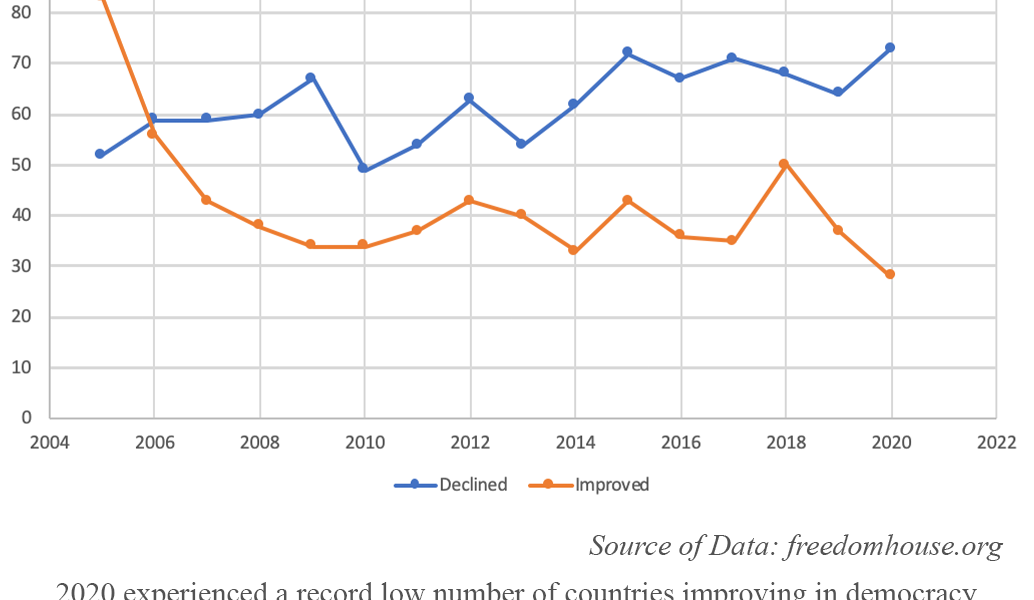By Tucker Dimberg
At the dawn of the 21st century, many believed the new millennium to be bright and full of democratic ideals permeating throughout the world, penetrating once thought steadfast authoritarian regimes. Autocratic ideals fell in countries such as Gambia, Myanmar, and the lone success of the Arab Sprig, Tunisia. Despite this, a frightening trend only exacerbated by the onset of the COVID-19 pandemic reveals that many democratic governments are in a perceived “backslide”, or a shift to more authoritarian tendencies, while already authoritarian governments only tightened their control over liberty and democracy.
International IDEA’s Global Democracy Report for 2021 shows that a peak number of countries ever recorded are experiencing “democratic erosion”, or a slight decline in democratic qualities, while the highest number of countries in the last decade are experiencing “democratic backsliding” a more severe version of the erosion previously mentioned. These backsliding countries include political powerhouses such as Brazil, India, and even the United States. In addition to the weathering of established democracies, the pandemic provided a viable façade for many hybrid regimes, or a mix between authoritarian and democratic, as well as authoritarian to brazenly oppress and silence their citizens.
To this end, even elected governments are utilizing frighteningly authoritarian policies. In doing so, they often receive popular support for these policies, under the pretext of pandemic management and economic prosperity. IDEA recognizes that many democracies worryingly took steps to politicize the judicial system, establish a biased media, and restrict civil/minority rights.
Officially, over the past five years, twenty countries have been downgraded from either Democracy to Hybrid Regime, or Hybrid to Authoritarian, while only seven countries have been upgraded from either. One notable transition is the rise of the Tatmadaw, a military coup in Myanmar, which reverts it back to an authoritarian regime only six years after the rise of Aung San Suu Kyi, the leader who restored democracy to the region. Myanmar had been one of the main democratic success stories in recent times, only for it to fall harshly back to its old form. This coup is mirrored in countries such as Mali, who has just experienced its third coup d’état in ten years, severely hampering the democratic development. These reversals of regime are a worrying sight for many burgeoning democracies. The advent of a tense situation in COVID-19 led many governments to cease advancements.
This deterioration is not exclusive to weaker democracies. Established democracies have experienced erosion in the core attributes in their governments. Countries such as Brazil, India, and Poland have experienced the worst erosion in their democracy as compared to other countries over the past ten years. Brazilian president Jair Bolsonaro has caused a serious decay in the country’s institutions, accusing court magistrates of preparing a fraudulent election and claiming he will not follow the decrees of the Supreme Federal Court. In Poland, the incumbent candidate Andrzej Duda attempted to alter the electoral rules less than six months before the election, bypassing parliament and the National Electoral Commission. They have also established restrictive abortion legislation and created “LGBTQ Free Zones,” representing a frightening reversion of social justice. India experienced serious erosion specifically because of the COVID pandemic. Many reports of harassment and arrests of rights advocates, journalists, and academics plague the Indian government, coupled with harassment of Muslim minorities, and Internet obstructions. Even the supposed symbol of spreading democracy, the United States, suffers from its own drawbacks. Allegations of voter fraud and disinformation spreading like wildfire has damaged the public’s trust in the electoral process, ultimately resulting in the January 6 attack on the Capitol. In addition, the United States also enacted a travel ban onto China, while maintaining open ravel for Europe. There has also been widespread election process reform across many states that have been found to disproportionately impact minorities.
In addition to democracies foundations crumbling, already authoritarian governments are taking this opportunity to tighten their fist. The percent of non-democratic regimes that have significantly declined in one democratic attribute has increased from 21 percent in 2015 to 45 percent in 2020. The most severe offenders of this are Côte d’Ivoire, Turkey, and Guinea. The president in Côte d’Ivoire, Alassane Ouattara, has won his third term of presidency in the 2020 election, taking 94 percent of the vote. This was due to his opposition leaders urging their supporters to not vote in the polls, due to a constitutional crisis regarding the incumbent’s third term. The opposition claims that he is violating his term limits, as Côte d’Ivoire only calls for two terms, but his supporters cite a change to the constitution in 2016 meaning his first term is void. The election itself was marred by violence and intimidation tactics, resulting in 23 percent of polling stations not opening due to threats. Turkey has pulled itself out of the Istanbul Convention, a legally binding council for the advancement of women’s rights. Guinea has gone under its own coup leading to Col Mamady Doumbouya seizing power in the country. Every international commission has condemned the military junta, who claims to be moving in a transition to civilian rule, without specification on a time frame for the transition.
In a century that was once thought to be the beacon of democracy, the past five years provided a humbling blow to the image of freedom around the world. A global crisis reverted many governments to a harsher and more extreme type of governance. The coming years will shed light on the future of democracy for the coming generations.





